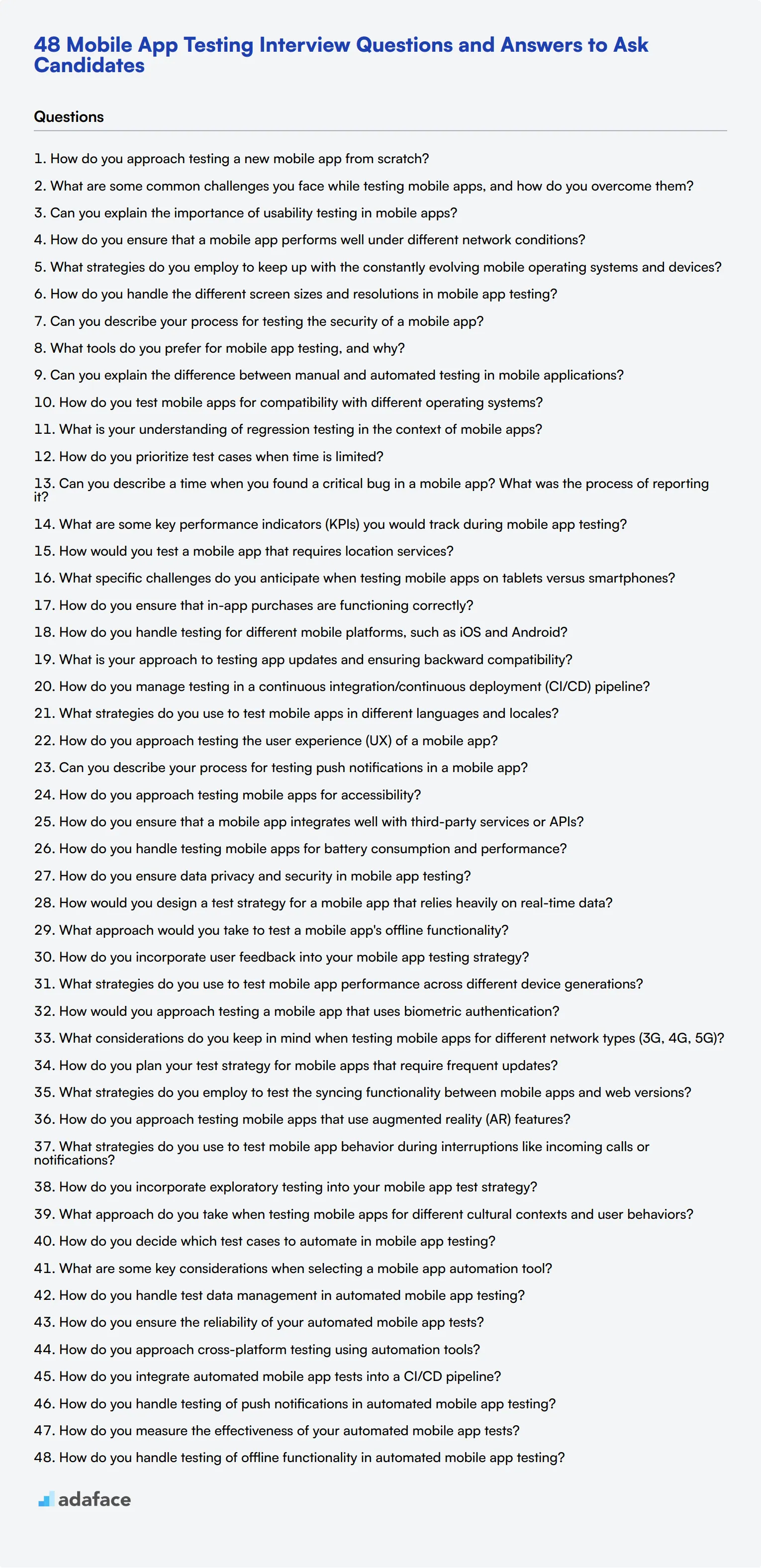Recruiting the right mobile app testers can make or break your product's success. Asking the right interview questions is crucial to revealing candidates' skills and expertise.
This blog post provides a comprehensive list of mobile app testing interview questions segmented by experience level and specific focus areas. The categories include general questions, junior and mid-tier candidate queries, test strategies, and automation tools.
Using these questions, you can effectively evaluate candidates' proficiency and suitability for your role. Additionally, consider using Adaface's mobile app testing assessments before interviews to refine your candidate pool.
Table of contents
7 general Mobile App Testing interview questions and answers
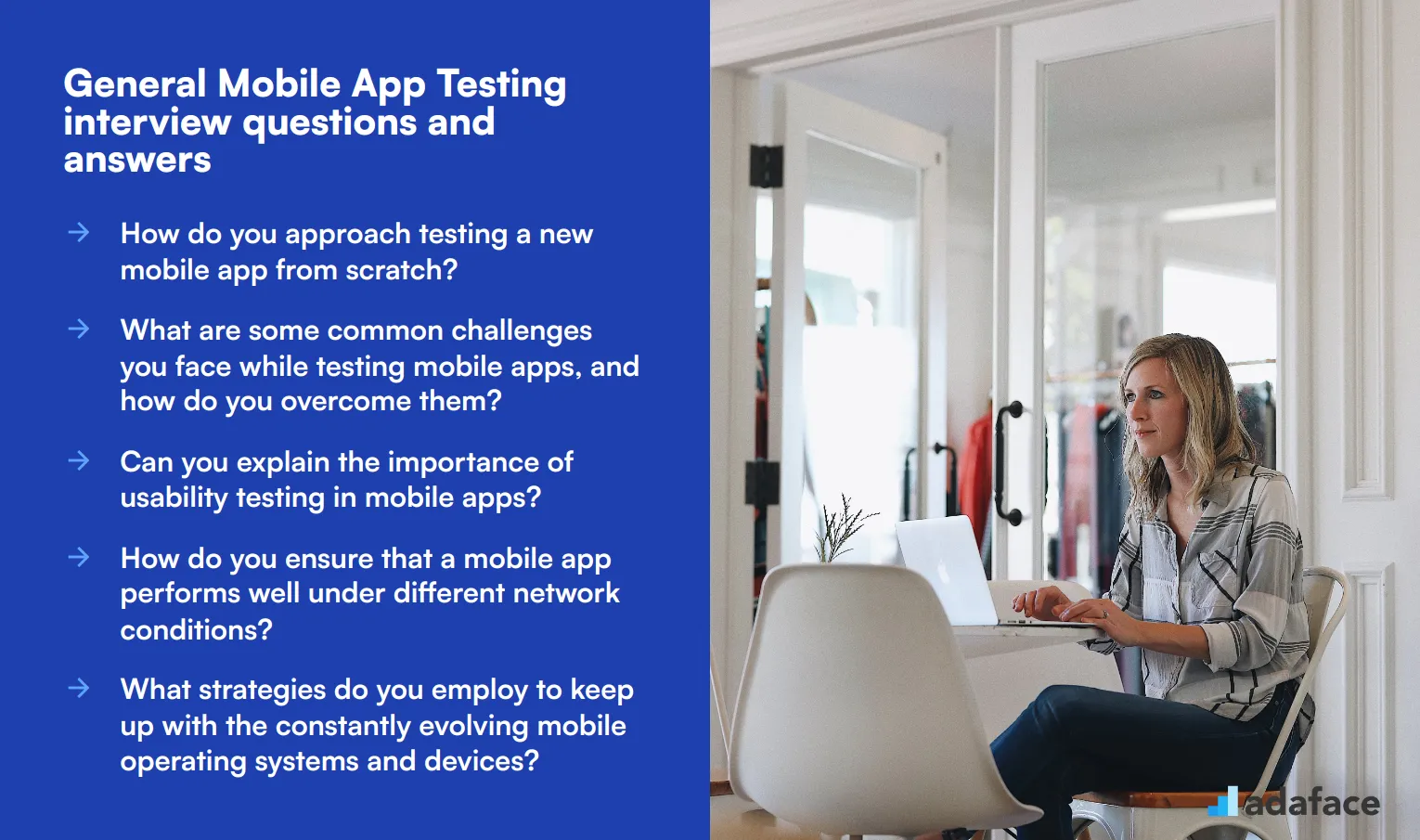
Whether you’re a seasoned recruiter or a hiring manager, having a solid set of general mobile app testing interview questions is key. These questions will help you assess whether your candidates have the necessary skills and understanding to ensure your mobile app meets quality standards.
1. How do you approach testing a new mobile app from scratch?
When testing a new mobile app from scratch, the candidate should start by understanding the app’s requirements and user stories. They should create a comprehensive test plan covering all functionalities, user interface, and performance aspects.
The candidate should also mention the importance of setting up a test environment and selecting appropriate testing tools. They should discuss both manual and automated testing approaches to cover different scenarios and edge cases.
Look for candidates who demonstrate a structured approach and emphasize thoroughness in planning and execution. Their response should reflect an understanding of both functional and non-functional testing aspects.
2. What are some common challenges you face while testing mobile apps, and how do you overcome them?
Common challenges in mobile app testing include device fragmentation, varying screen sizes, and different operating systems. Another significant challenge is ensuring consistent performance under different network conditions.
To overcome these challenges, candidates should discuss using mobile device labs or emulators to test across multiple devices and operating systems. They should also mention strategies like using test automation to execute repetitive tests efficiently and employing performance testing tools to simulate different network conditions.
Ideal candidates will highlight their problem-solving skills and adaptability. They should provide examples of how they have successfully managed these challenges in past projects.
3. Can you explain the importance of usability testing in mobile apps?
Usability testing is crucial for mobile apps because it ensures the app is user-friendly and meets the expectations of its target audience. It helps identify navigational issues, design flaws, and other user experience problems.
Candidates should explain that usability testing involves real users interacting with the app to provide feedback on its ease of use. They should detail how this feedback is used to make iterative improvements to the app.
Look for candidates who understand the importance of a positive user experience and can describe specific methods for conducting usability testing, such as user interviews, surveys, or A/B testing.
4. How do you ensure that a mobile app performs well under different network conditions?
To ensure a mobile app performs well under different network conditions, candidates should discuss conducting performance testing. This involves simulating various network speeds and conditions to observe how the app behaves.
They should mention using tools like network throttling in browsers or specific mobile testing tools to simulate different scenarios. Monitoring app performance metrics such as load times, response times, and offline functionality is also essential.
An ideal candidate will emphasize the importance of robust performance testing and share examples of how they have optimized app performance based on test results.
5. What strategies do you employ to keep up with the constantly evolving mobile operating systems and devices?
Staying updated with evolving mobile operating systems and devices is critical. Candidates should mention subscribing to industry news, joining relevant forums, and participating in webinars or conferences to keep their knowledge current.
They might also highlight the importance of continuous education and training, such as taking online courses or obtaining certifications in mobile testing.
Look for candidates who demonstrate a proactive approach to learning and adapting to new technologies. Their response should reflect an ongoing commitment to professional development in the mobile testing field.
6. How do you handle the different screen sizes and resolutions in mobile app testing?
Handling different screen sizes and resolutions involves creating a comprehensive test matrix that covers a wide range of devices. Candidates should discuss using responsive design principles to ensure the app's layout adjusts correctly on various screens.
They should also mention employing both manual and automated testing methods to verify the app's appearance and functionality on different devices. Using tools like emulators or real device testing platforms can help achieve this.
Ideal responses will emphasize attention to detail and thoroughness in testing across multiple devices. Candidates should demonstrate their ability to identify and fix layout and usability issues related to different screen sizes and resolutions.
7. Can you describe your process for testing the security of a mobile app?
Testing the security of a mobile app involves identifying potential vulnerabilities and ensuring that data is protected. Candidates should discuss conducting security assessments such as penetration testing, code reviews, and vulnerability scanning.
They should also mention the importance of securing data transmission through encryption and ensuring compliance with security standards and best practices.
Look for candidates who demonstrate a strong understanding of security principles and can provide examples of how they have identified and mitigated security risks in previous projects.
10 Mobile App Testing interview questions to ask junior testers
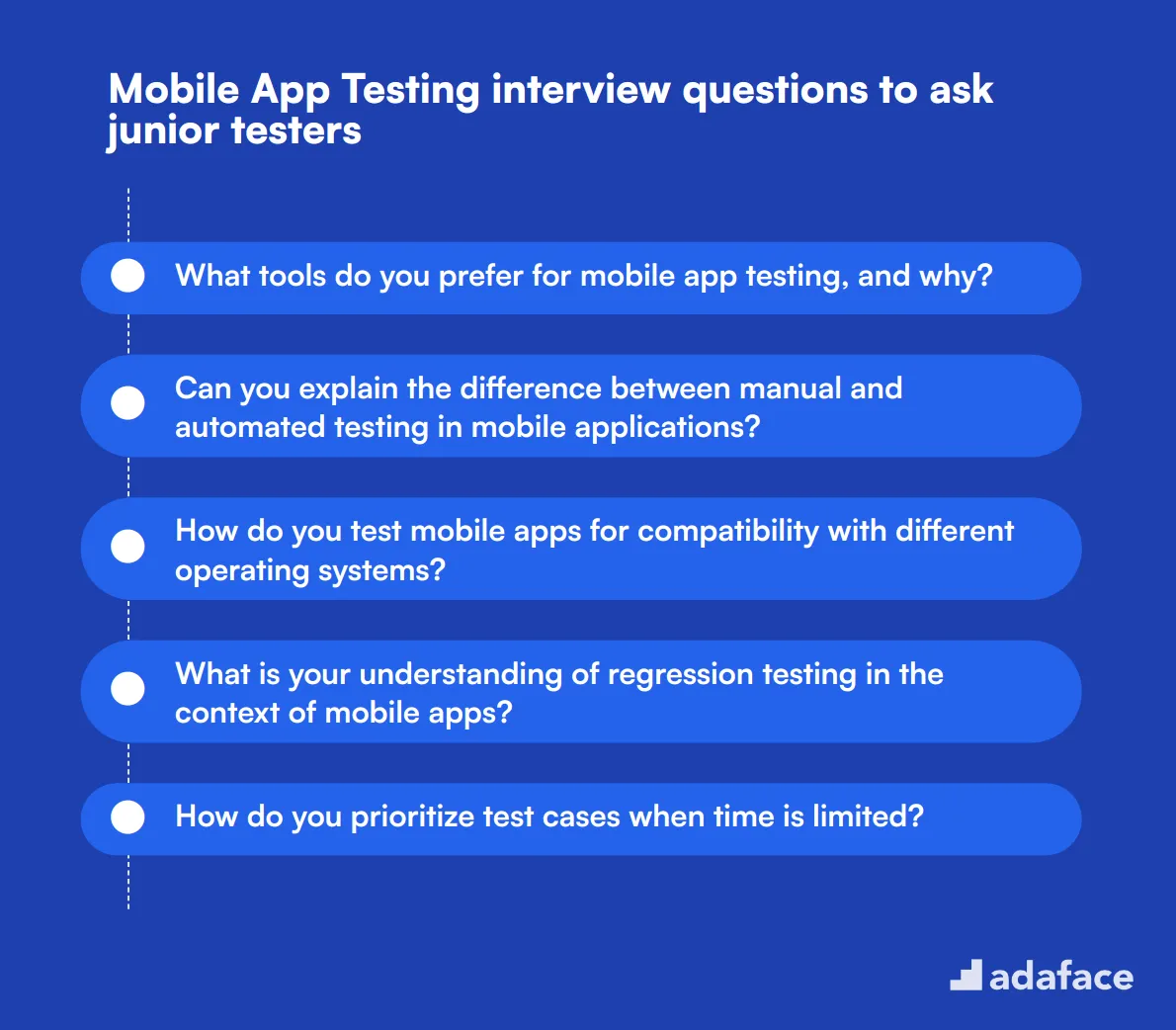
To evaluate whether junior testers have the necessary skills for mobile app testing, consider asking them some of these insightful questions. This list can help you gauge their understanding of essential testing concepts and ensure they are well-equipped for the role, especially when looking for candidates who can fit into your team effectively. For more specific roles, you may also refer to job descriptions like this software tester job description.
- What tools do you prefer for mobile app testing, and why?
- Can you explain the difference between manual and automated testing in mobile applications?
- How do you test mobile apps for compatibility with different operating systems?
- What is your understanding of regression testing in the context of mobile apps?
- How do you prioritize test cases when time is limited?
- Can you describe a time when you found a critical bug in a mobile app? What was the process of reporting it?
- What are some key performance indicators (KPIs) you would track during mobile app testing?
- How would you test a mobile app that requires location services?
- What specific challenges do you anticipate when testing mobile apps on tablets versus smartphones?
- How do you ensure that in-app purchases are functioning correctly?
10 intermediate Mobile App Testing interview questions and answers to ask mid-tier testers.
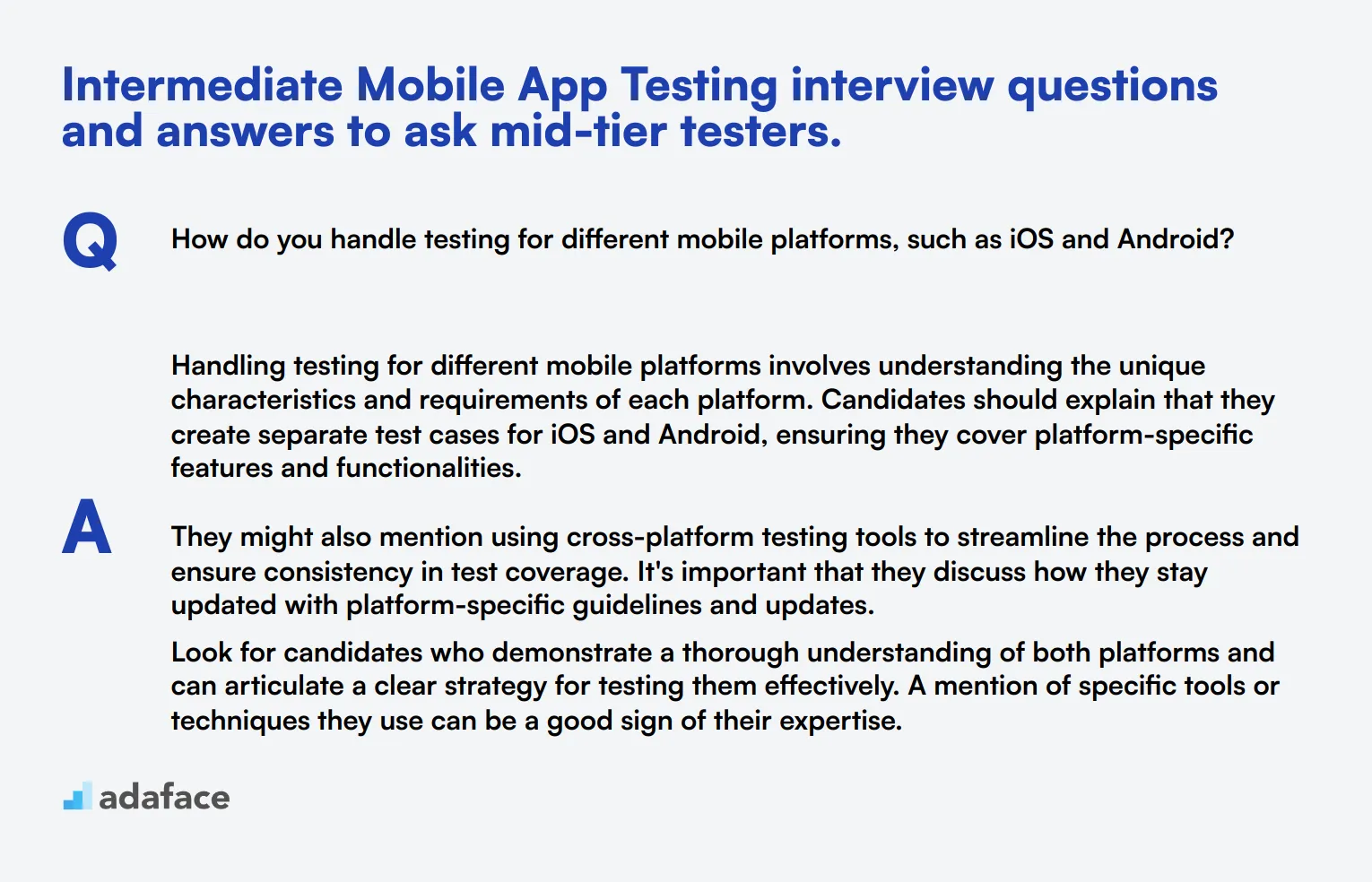
For hiring managers looking to identify strong mid-tier mobile app testers, this list of intermediate interview questions will help you dig deeper into their skills and experiences. These questions are designed to gauge their practical knowledge and problem-solving abilities, ensuring you find the right fit for your team.
1. How do you handle testing for different mobile platforms, such as iOS and Android?
Handling testing for different mobile platforms involves understanding the unique characteristics and requirements of each platform. Candidates should explain that they create separate test cases for iOS and Android, ensuring they cover platform-specific features and functionalities.
They might also mention using cross-platform testing tools to streamline the process and ensure consistency in test coverage. It's important that they discuss how they stay updated with platform-specific guidelines and updates.
Look for candidates who demonstrate a thorough understanding of both platforms and can articulate a clear strategy for testing them effectively. A mention of specific tools or techniques they use can be a good sign of their expertise.
2. What is your approach to testing app updates and ensuring backward compatibility?
Testing app updates and ensuring backward compatibility involves checking that new features integrate well with existing ones and that the app continues to work on older versions of the operating system. Candidates should explain that they perform regression testing to identify any issues introduced by new updates.
They might also mention maintaining a comprehensive suite of test cases that cover both new and old functionalities. It's crucial to test on multiple devices with different OS versions to ensure the app works seamlessly across all supported versions.
Ideal candidates will demonstrate an understanding of the importance of backward compatibility and provide examples of how they have managed this in past projects. Look for those who emphasize thorough testing and the use of automated tools to maintain efficiency.
3. How do you manage testing in a continuous integration/continuous deployment (CI/CD) pipeline?
Managing testing in a CI/CD pipeline involves integrating automated tests into the build process, ensuring that code changes are tested immediately after they are made. Candidates should explain that they set up automated test scripts to run as part of the CI/CD pipeline, providing quick feedback on the quality of the code.
They might also mention using tools like Jenkins, Travis CI, or CircleCI to automate the build and testing process. It's important to discuss how they handle test failures and ensure that issues are addressed promptly.
Look for candidates who have hands-on experience with CI/CD pipelines and can provide examples of how they have successfully integrated testing into these workflows. An understanding of automated testing tools and frameworks is essential.
4. What strategies do you use to test mobile apps in different languages and locales?
Testing mobile apps in different languages and locales involves ensuring that the app's content is accurately translated and that the user interface accommodates different text lengths and formats. Candidates should explain how they create test cases for each supported language and locale, focusing on both functionality and usability.
They might also mention using tools for localization testing and collaborating with native speakers or localization experts to verify translations. It's important to test on devices set to different locales to identify any issues with date formats, currencies, and other locale-specific elements.
Ideal candidates will demonstrate an understanding of the complexities involved in localization testing and provide examples of how they have handled this in past projects. Look for those who emphasize thorough testing and attention to detail.
5. How do you approach testing the user experience (UX) of a mobile app?
Testing the user experience (UX) of a mobile app involves evaluating how intuitive and enjoyable the app is to use. Candidates should explain that they conduct usability testing with real users to gather feedback on the app's design, navigation, and overall experience.
They might also mention using UX testing tools to analyze user interactions and identify pain points. It's important to discuss how they incorporate user feedback into the development process to improve the app's UX.
Look for candidates who understand the importance of user-centered design and can provide examples of how they have conducted UX testing in the past. An ability to empathize with users and translate feedback into actionable improvements is key.
6. Can you describe your process for testing push notifications in a mobile app?
Testing push notifications in a mobile app involves verifying that notifications are sent correctly and received by users as expected. Candidates should explain that they test push notifications under various conditions, such as when the app is running in the background or the device is locked.
They might also mention testing different types of notifications, including alerts, banners, and badges, to ensure they display correctly and link to the intended app locations. It's important to discuss how they test notifications on different devices and OS versions.
Ideal candidates will demonstrate an understanding of the technical aspects of push notifications and provide examples of how they have tested them in past projects. Look for those who emphasize thorough testing and attention to detail.
7. How do you approach testing mobile apps for accessibility?
Testing mobile apps for accessibility involves ensuring that the app can be used by people with disabilities, such as those with visual, auditory, or motor impairments. Candidates should explain that they follow accessibility guidelines, such as WCAG, and use tools to check for compliance.
They might also mention conducting manual testing with assistive technologies, such as screen readers and voice control, to identify any issues. It's important to discuss how they collaborate with accessibility experts and incorporate user feedback to improve the app's accessibility.
Look for candidates who demonstrate a commitment to accessibility and can provide examples of how they have tested for it in past projects. An understanding of accessibility standards and tools is essential.
8. How do you ensure that a mobile app integrates well with third-party services or APIs?
Ensuring that a mobile app integrates well with third-party services or APIs involves testing the app's interactions with these external systems. Candidates should explain that they create test cases to cover different scenarios, such as successful responses, error handling, and timeouts.
They might also mention using tools to simulate API responses and test the app's behavior under various conditions. It's important to discuss how they monitor the app's performance and ensure that it handles data correctly from third-party services.
Ideal candidates will demonstrate an understanding of the complexities involved in API integration and provide examples of how they have tested it in past projects. Look for those who emphasize thorough testing and attention to detail.
9. How do you handle testing mobile apps for battery consumption and performance?
Testing mobile apps for battery consumption and performance involves evaluating how the app affects the device's battery life and overall performance. Candidates should explain that they use profiling tools to measure the app's resource usage and identify areas for optimization.
They might also mention testing under different conditions, such as varying network connectivity and device states, to understand how the app performs in real-world scenarios. It's important to discuss how they address performance issues and optimize the app's efficiency.
Look for candidates who demonstrate an understanding of the importance of performance testing and can provide examples of how they have managed this in past projects. An ability to use profiling tools and optimize code is key.
10. How do you ensure data privacy and security in mobile app testing?
Ensuring data privacy and security in mobile app testing involves verifying that the app follows best practices for data protection and complies with relevant regulations. Candidates should explain that they conduct security testing to identify vulnerabilities, such as improper data storage and transmission.
They might also mention testing for common security issues, such as SQL injection and cross-site scripting, and using tools to automate security scans. It's important to discuss how they work with developers to address security issues and ensure that sensitive data is handled correctly.
Ideal candidates will demonstrate an understanding of data privacy and security best practices and provide examples of how they have tested for them in past projects. Look for those who emphasize thorough testing and attention to detail, as well as knowledge of relevant regulations.
12 Mobile App Testing questions related to test strategies
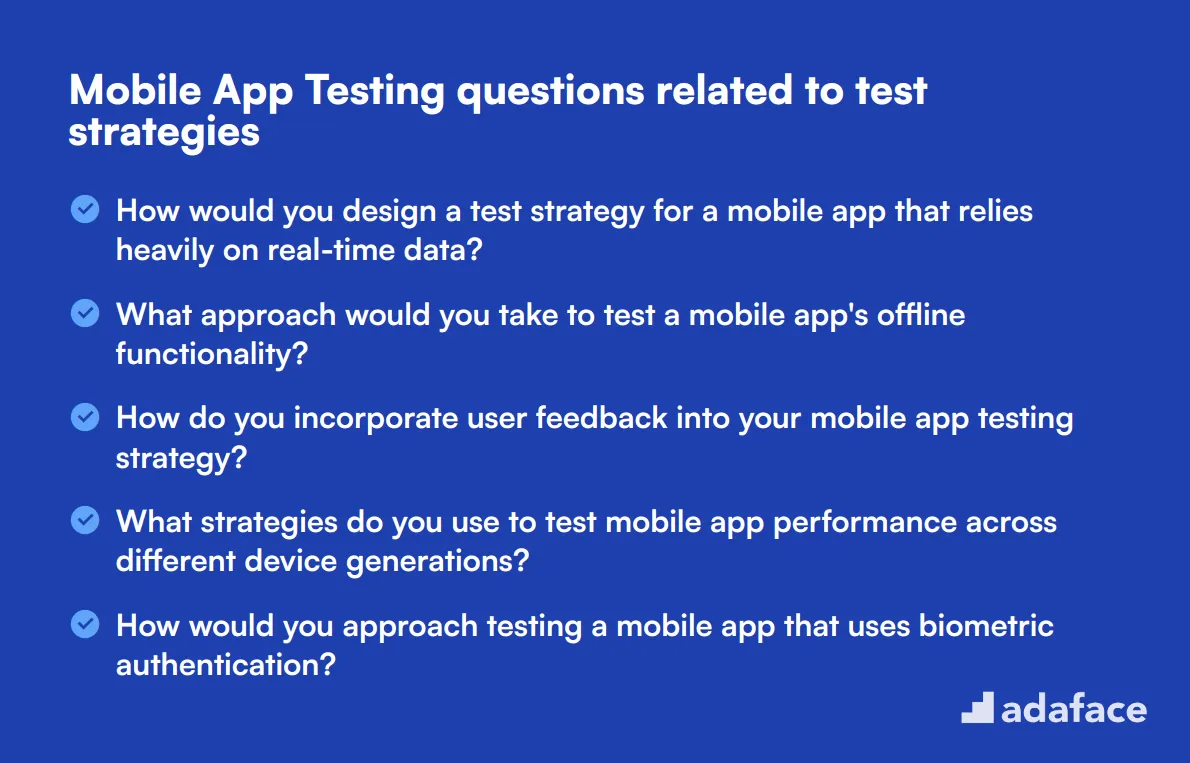
To assess candidates' understanding of mobile app testing strategies, use these 12 interview questions. They'll help you gauge applicants' ability to plan, execute, and optimize testing processes for various mobile applications.
- How would you design a test strategy for a mobile app that relies heavily on real-time data?
- What approach would you take to test a mobile app's offline functionality?
- How do you incorporate user feedback into your mobile app testing strategy?
- What strategies do you use to test mobile app performance across different device generations?
- How would you approach testing a mobile app that uses biometric authentication?
- What considerations do you keep in mind when testing mobile apps for different network types (3G, 4G, 5G)?
- How do you plan your test strategy for mobile apps that require frequent updates?
- What strategies do you employ to test the syncing functionality between mobile apps and web versions?
- How do you approach testing mobile apps that use augmented reality (AR) features?
- What strategies do you use to test mobile app behavior during interruptions like incoming calls or notifications?
- How do you incorporate exploratory testing into your mobile app test strategy?
- What approach do you take when testing mobile apps for different cultural contexts and user behaviors?
9 Mobile App Testing interview questions and answers related to automation tools
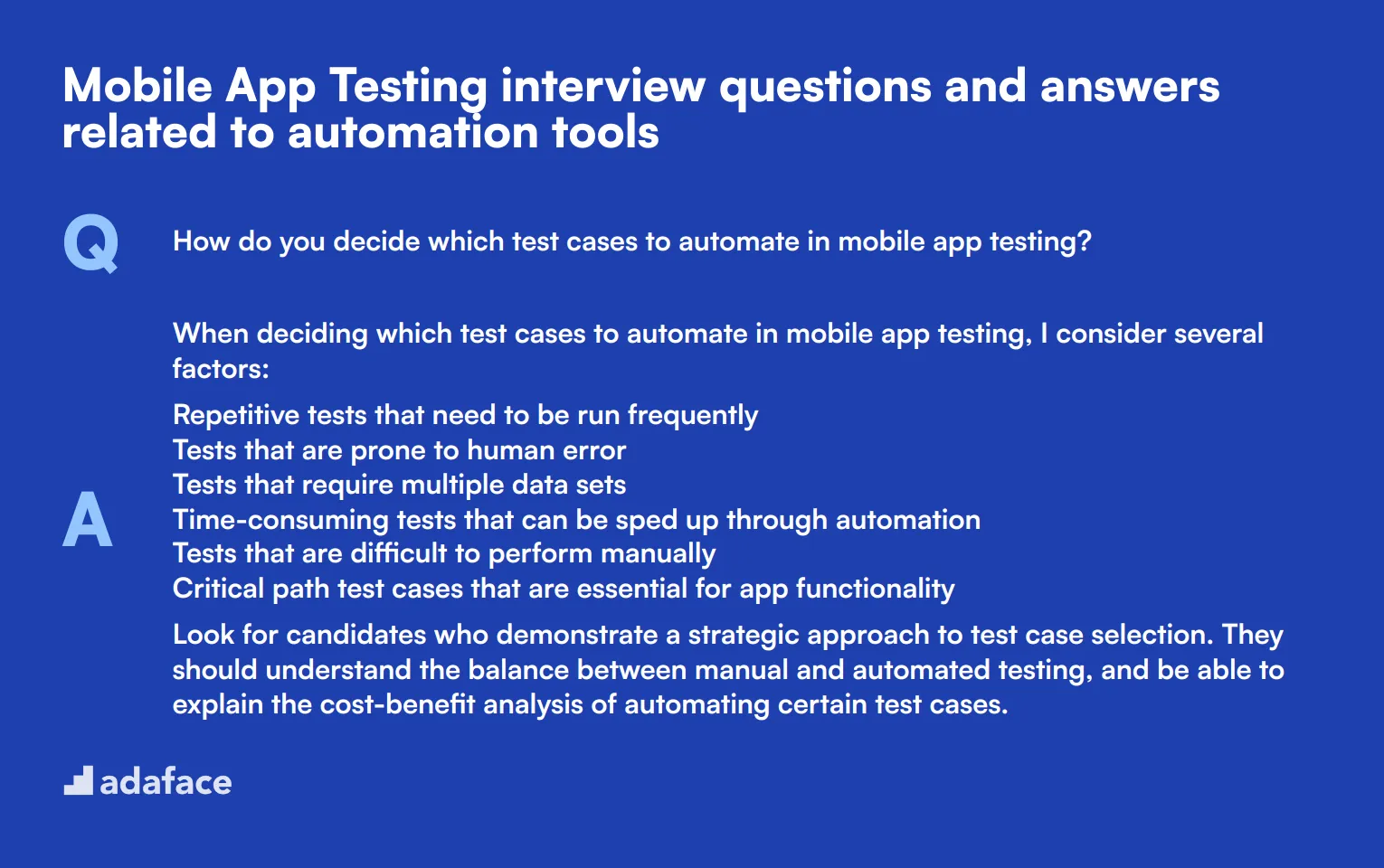
When it comes to mobile app testing, automation tools play a crucial role. These questions will help you gauge a candidate's expertise in using automation tools effectively. Use this list to assess their practical knowledge and problem-solving skills in real-world scenarios.
1. How do you decide which test cases to automate in mobile app testing?
When deciding which test cases to automate in mobile app testing, I consider several factors:
- Repetitive tests that need to be run frequently
- Tests that are prone to human error
- Tests that require multiple data sets
- Time-consuming tests that can be sped up through automation
- Tests that are difficult to perform manually
- Critical path test cases that are essential for app functionality
Look for candidates who demonstrate a strategic approach to test case selection. They should understand the balance between manual and automated testing, and be able to explain the cost-benefit analysis of automating certain test cases.
2. What are some key considerations when selecting a mobile app automation tool?
When selecting a mobile app automation tool, I consider the following key factors:
- Compatibility with target platforms (iOS, Android)
- Support for different types of apps (native, hybrid, web)
- Ease of use and learning curve
- Integration with existing CI/CD pipeline
- Reporting and analytics capabilities
- Community support and documentation
- Cost and licensing model
- Ability to handle complex gestures and interactions
A strong candidate should demonstrate awareness of the diverse needs in mobile app testing and how different tools cater to these needs. They should also show an understanding of how the tool fits into the larger testing and development ecosystem.
3. How do you handle test data management in automated mobile app testing?
Test data management in automated mobile app testing involves several strategies:
- Using data-driven testing approaches
- Implementing test data generators
- Maintaining separate test environments with controlled data
- Using mock data or API simulation for backend dependencies
- Implementing data cleanup and reset mechanisms after each test run
- Ensuring data privacy and security in test environments
Look for candidates who understand the importance of reliable and consistent test data. They should be able to explain methods for maintaining test data integrity across multiple test runs and environments.
4. How do you ensure the reliability of your automated mobile app tests?
To ensure the reliability of automated mobile app tests, I focus on several key areas:
- Implementing proper wait times and synchronization mechanisms
- Using stable element locators
- Handling different screen orientations and sizes
- Implementing retry mechanisms for flaky tests
- Regular maintenance and updates of test scripts
- Continuous monitoring of test results and quick addressing of failures
- Implementing proper error handling and logging
A good candidate should demonstrate an understanding of the challenges specific to mobile app testing, such as device fragmentation and network instability. They should be able to explain strategies for creating robust and maintainable test scripts.
5. How do you approach cross-platform testing using automation tools?
When approaching cross-platform testing using automation tools, I consider the following strategies:
- Using tools that support both iOS and Android platforms
- Implementing a common test framework with platform-specific implementations where necessary
- Utilizing abstraction layers to handle platform differences
- Maintaining separate test suites for platform-specific features
- Implementing parallel test execution for faster results across platforms
- Using cloud-based device farms for broader device coverage
Look for candidates who understand the nuances of different mobile platforms and can explain how to create efficient, maintainable test suites that work across multiple platforms. They should also be aware of the challenges in ensuring consistent behavior across different devices and OS versions.
6. How do you integrate automated mobile app tests into a CI/CD pipeline?
Integrating automated mobile app tests into a CI/CD pipeline involves several steps:
- Selecting a CI/CD tool that supports mobile app builds and testing
- Setting up automated builds for different environments (dev, staging, production)
- Configuring test execution as part of the build process
- Implementing parallel test execution to reduce pipeline time
- Setting up automated deployment to test devices or emulators
- Configuring result reporting and notifications
- Implementing quality gates based on test results
A strong candidate should demonstrate knowledge of CI/CD principles and how they apply to mobile app development. They should be able to explain how automated tests fit into the larger development and deployment process, and how they contribute to maintaining code quality and reducing time-to-market.
7. How do you handle testing of push notifications in automated mobile app testing?
Testing push notifications in automated mobile app testing can be challenging. Here's how I approach it:
- Using mock servers to simulate push notification services
- Implementing API-level tests to verify notification payload generation
- Using device farm services that support push notification testing
- Creating automated scripts to trigger notifications and verify their receipt
- Testing different scenarios like app in foreground, background, and closed states
- Verifying notification content, deep linking, and user interaction flows
Look for candidates who understand the complexities of push notification testing and can explain both the technical aspects of implementing such tests and the various scenarios that need to be covered. They should also be aware of the limitations of automated testing in this area and when manual testing might be necessary.
8. How do you measure the effectiveness of your automated mobile app tests?
To measure the effectiveness of automated mobile app tests, I consider several metrics and practices:
- Test coverage: Ensuring critical app functionalities are covered
- Defect detection rate: Number of bugs found by automated tests
- False positive/negative rates: Accuracy of test results
- Test execution time: Speed of the automated test suite
- Maintenance effort: Time spent updating and fixing tests
- ROI: Comparing time saved vs. time invested in automation
- User-reported issues: Correlation with areas covered by automated tests
A good candidate should demonstrate an understanding of both quantitative and qualitative measures of test effectiveness. They should be able to explain how these metrics can be used to continuously improve the automated testing process and ultimately contribute to better app quality.
9. How do you handle testing of offline functionality in automated mobile app testing?
Testing offline functionality in automated mobile app testing requires specific strategies:
- Simulating various network conditions (offline, poor connectivity, etc.)
- Testing data synchronization when the app comes back online
- Verifying local data storage and retrieval in offline mode
- Checking app behavior during transition between online and offline states
- Testing offline actions and their impact when the app reconnects
- Verifying error handling and user notifications in offline mode
Look for candidates who understand the importance of offline functionality in mobile apps and can explain detailed approaches to testing it. They should be aware of the tools and techniques available for simulating different network conditions and how to automate these scenarios effectively.
Which Mobile App Testing skills should you evaluate during the interview phase?
Evaluating a candidate's mobile app testing skills during an interview can be challenging. While it's impossible to cover every aspect in one session, there are several key skills you should focus on to better understand their capabilities.
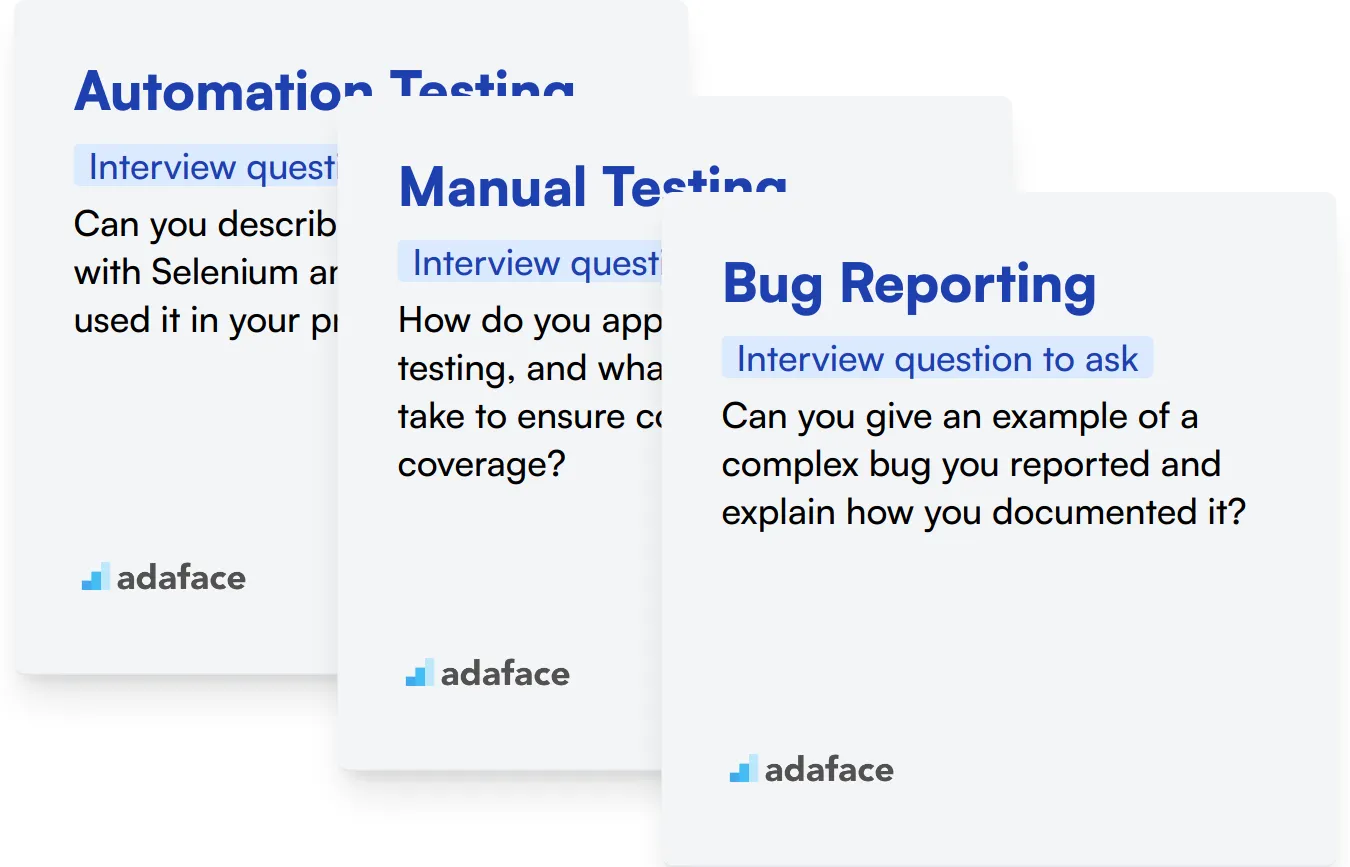
Automation Testing
Automation testing is crucial because it ensures that apps can withstand continuous use and maintain their functionality over time. It reduces manual testing efforts and increases test coverage.
You can use an assessment test that asks relevant MCQs to filter out this skill. For example, our Selenium online test can help evaluate a candidate's proficiency in automation testing.
You can also ask targeted interview questions to judge this skill. Consider asking about their experience with specific automation tools.
Can you describe your experience with Selenium and how you've used it in your previous projects?
Look for responses that detail specific projects and challenges they faced, as well as how they overcame those challenges using Selenium.
Manual Testing
Manual testing is essential for identifying bugs and issues that automated tests might miss. It involves the tester manually executing test cases without the use of any automation tools.
You can use an assessment test that asks relevant MCQs to filter out this skill. Our Manual Testing online test can help gauge a candidate's manual testing skills.
Another way to assess this skill is by asking about their approach to exploratory testing.
How do you approach exploratory testing, and what steps do you take to ensure comprehensive coverage?
Look out for candidates who discuss detailed methodologies and provide examples of how they uncovered critical issues during exploratory testing.
Bug Reporting
Effective bug reporting is important in ensuring that identified issues are communicated clearly and concisely to the development team. This skill impacts the efficiency of the bug resolution process.
You can assess this skill by asking candidates to describe their bug reporting process.
Can you give an example of a complex bug you reported and explain how you documented it?
Pay attention to how they describe the bug, including reproducibility steps, expected vs actual results, and the clarity of their communication.
Enhance Your Hiring Strategy with Mobile App Testing Skills Tests and Targeted Interview Questions
When aiming to hire top talent with Mobile App Testing skills, it’s important to verify that candidates truly possess the necessary expertise.
The most reliable way to assess these skills is through targeted skills tests. Adaface offers a variety of Programming Tests and IT Tests that can help ensure candidates' proficiency.
After administering these tests, you can efficiently filter and shortlist the highest performing candidates for interviews, ensuring only the most qualified get through.
To move forward with refining your hiring process, consider signing up on our Signup Page for access to the best assessment tools and resources.
Appium Android Online Test
Download Mobile App Testing interview questions template in multiple formats
Mobile App Testing Interview Questions FAQs
They help evaluate a candidate's technical skills, problem-solving abilities, and understanding of mobile app testing processes.
Look for basic knowledge of testing principles, familiarity with testing tools, and a willingness to learn.
Ask about specific tools they have used, their role in creating automated tests, and examples of successful automation projects.
Focus on intermediate concepts like debugging, test case writing, and experience with various testing methodologies.
They reveal a candidate's ability to plan, implement, and manage effective testing processes for mobile applications.
Behavioral questions help gauge a candidate’s teamwork, communication skills, and how they handle real-world testing challenges.

40 min skill tests.
No trick questions.
Accurate shortlisting.
We make it easy for you to find the best candidates in your pipeline with a 40 min skills test.
Try for freeRelated posts
Free resources




